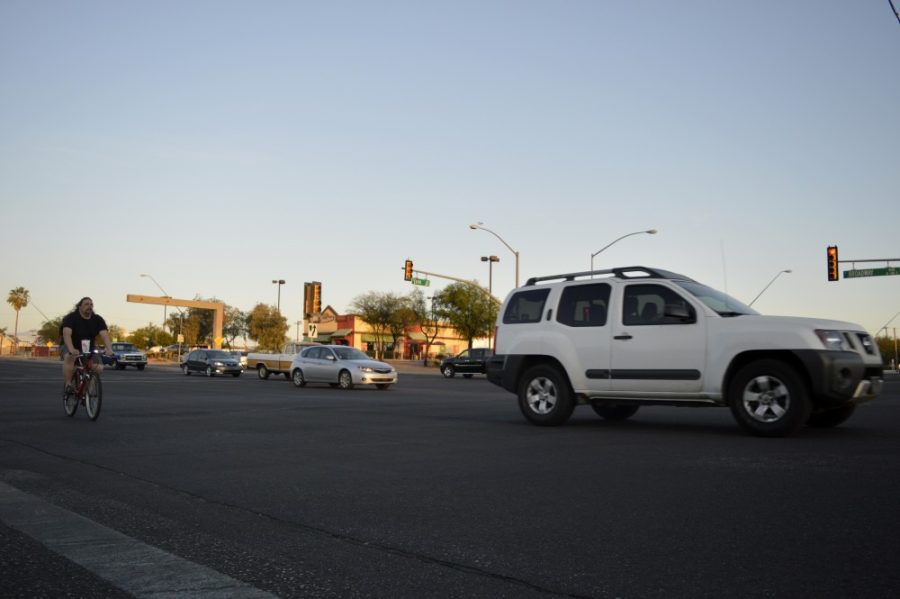Tucson City Council members voted 5-1 on April 19 to approve an $18 million project plan to begin negotiations and to buy needed properties in order to widen the area of Broadway Boulevard between Euclid Avenue and Country Club Road—a two-mile stretch.
The popular roadway was originally going to be widened to eight lanes, but now, it’ll only grow from four lanes to six. The plan will include sidewalks, bike lanes and new landscape and construction is not expected to begin until late 2017-2018, according to the project website.
Voters approved a half cent sales tax for a $71 million Regional Transportation Authority Project in May 2006.
Tucson City Councilman Steve Kozachik supported moving the draft into design when the council voted in June 2015, but did not vote to move the project forward last Tuesday.
Kozachik said what the council voted on does not reflect the voice of the Tucson community. Neighborhood leaders and business owners gathered two days prior to the vote to protest the expansion.
“We’ve heard it again and again,” Kozachik said. “They want preservation, a sense of place, they want destinations. They don’t want to spend $71 million dollars to lay down a bunch of asphalt.”
The demographics and trends all indicate that people—including UA students—are looking for a more walkable urban environment, according to Kozachik.
“We’re building a corridor that the concepts for the corridor are three decades in the rearview mirror,” Kozachik said. “If I hear one more time someone say we’re only doing this because the voters told us to, I’m going to puke.”
Tucson City Councilman Paul Cunningham said this was one of the toughest decisions they’ve had on the council and a lot of Tucsonans are divided on the issue. Cunningham voted in favor of the project.
“My best guess is that in the overall big picture, the due diligence has been done and I stand by my vote,” Cunningham said.
Beth Abramovitz, project manager of the Broadway Improvement Project, said the change from eight lanes to six was a compromise for the better.
Abramovitz said she believes the widening will benefit UA students and cyclists by using the pathways to connect to Park Avenue and Tyndall Avenue.
“Broadway will now be more walkable and bikeable for the entire section from Euclid Avenue to Campbell Avenue,” Abramovitz said. “Anyone who uses a bike or walks to get around—which is a lot of the college students—it’ll be more conducive for that.”
Contrary to Kozachik’s stance on businesses, Abramovitz said the widening will increase traffic, which will increase business growth.
“If we don’t do the widening and Broadway gets too congested, people are going to find alternative routes,” Abramovitz said. “They’re going to take Grant Road, 22nd Street or Speedway Boulevard and people will forget that, ‘Oh! That dry cleaner is right there, or that coffee place is right there.’”
People aren’t going to fight traffic, according to Abramovitz, and most of the businesses along Broadway Boulevard rely on passing traffic for business.
The highly controversial project to widen Broadway Boulevard leaves elected officials, city leaders and the community divided on whether it’s the best decision for the city.
The only winners in the widening, according to Kozachik, are “a big bank, a big law firm and a big corporation. The losers are the small local businesses that we say as a council that we value.”
Follow the Daily Wildcat on Twitter.









